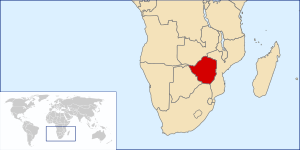Greeks in Zimbabwe
[3] In the modern era, many Greeks came by way of Cyprus, Greece and to a lesser extent South Africa, the Congo and Egypt to Zimbabwe, coming in waves from the 1950s to the early 1970s.
The vast majority of these migrants came to Harare, which still feature noticeable Hellenic heritage with churches, restaurants, small businesses, and social clubs.
Suburbs that became Greek hubs during this era include Milton Park, Greendale, Newlands, Highlands, and Eastlea, the latter where the Hellenic Club of Harare is based.
[4] Few Greek people resided in early Rhodesia, due to an immigration policy that favoured British settlers, while discriminating against Europeans particularly those from non-Protestant backgrounds.
[5] The line of thinking behind this policy was clearly articulated by Ethel Tawse Jollie who noted in the Zimbabwe Herald in the 1920s that: The average British-born Rhodesian feels that this is essentially a British country, pioneered, bought and developed by British people, and he wants to keep it so[5]Many Greeks immigrated to Zimbabwe for a better life, in the wake of World War II and the Greek Civil War, fought from 1946 to 1949.
[3] A greater influx of Greek immigration took place in the 1950s and 1960s due to economic and political problems in Greece and as the country's economy expanded during the Federal years.
[1] The country's highest-scoring flying ace of World War II, John Plagis, was the son of Greek immigrants from the island of Lemnos.
